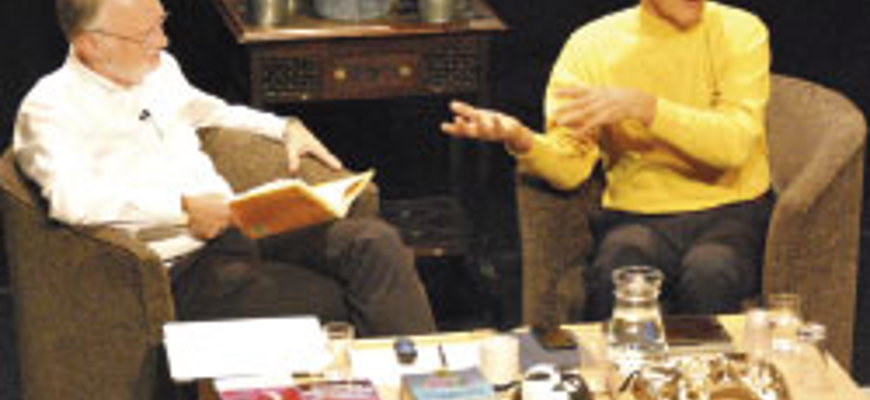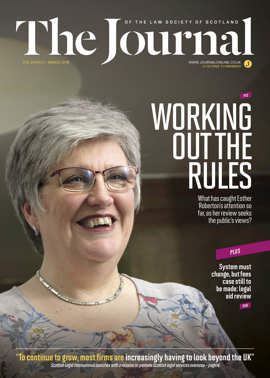Conflict theory: it works

International mediator Ken Cloke, one of the leading writers and thinkers in the field of conflict, joined John Sturrock, senior mediator at Core, and more than 50 mediators and professionals at the Scottish Storytelling Centre on Friday 29 September 2017 for a day of learning and reflection about solving conflict in society. Participants were treated to a masterclass of discussion and wisdom on topics ranging from personal disagreement to international political conflict, and on how greater diversity can lead to different perspectives to help solve conflicts. John MacKenzie, partner and solicitor advocate, Shepherd & Wedderburn, encapsulated his experience of the event in this blog:
A reflection on the nature of conflict
I recently attended a fascinating and thought-provoking event hosted by John Sturrock and Collaborative Scotland. Ken Cloke, the renowned international mediator, was the main speaker. The premise of the event was the challenge of engaging in respectful dialogue in Scottish politics. In the event, the discussion became a reflection on the nature of conflict and approaches to resolution of that conflict. As part of the event, John was advocating that individuals and organisations sign the Commitment to Respectful Dialogue. This can be found at www.collaborativescotland.org/commitment/
It is tempting, as someone who is involved in disputes on a day-to-day basis, to be sceptical about the practical application of such a commitment to respectful dialogue, however laudable it may be. It is all too easy to dismiss theorists as just wanting to “talk about your feelings”; to explore hidden meanings; to seek a win for all. Instead, the reality of conflict for the legal profession, as a client very recently described it, is of trench warfare. A structured and formulaic approach, with an increasingly fractious and intemperate use of language now normalised in our political process. So as I settled down to listen to the conversation between John and Ken, I was open-minded, but had relatively low expectations.
Powerful witness
In the end, the whole experience was unexpectedly moving, thought-provoking, and challenging. Every proposition put forward by Ken was born of science and experience.
Why was it so impactful? I expect context is everything. Each member of the audience had their own perspective. Whether it was race, religion, gender, family or business, there were many different stories to tell. Hearing others speak of their challenges of truly horrific conflict, and the resolution of that conflict, made me feel very humble. Hearing others express their frustration about their inability to draw people into the process of conflict resolution led to an almost tangible empathy in the room for the speakers.
For me, the context was politics (a relatively abstract frustration with the dangerously superficial nature of the political process), process (the legal process and a feeling there must be a better way), and personal (dealing with the inevitable conflicts that arise day to day).
Four observations made during the course of the event resonated strongly with me as being applicable to my present situation, each partly explaining why some conflicts seem intractable.
- First, the notion that conflict arises when one party to a relationship says there is a conflict. If the relationship isn’t working for one of the parties to the relationship, then it isn’t working.
- Secondly, the suggestion that dialogue is “the stream of meaning that flows between us”.
- Thirdly, the phenomenon of the “asphyxiation of dialogue by rhetoric”.
- Fourthly, the notion that every objection is an opportunity for improvement.
Catalyst for change
The other feature of the event was an exploration of the way in which base emotions inform how we behave. In truth, we do not devote time and effort to understanding what it is that we all care about, and how that manifests itself in behaviours. Instead we see only superficial behaviours, and react to the meaning that we ascribe to those behaviours. This results in lazy stereotyping, to suit our own views. It also results in poor communication and a lack of understanding of what others are trying to achieve.
The event was the catalyst for a change in my own behaviour. It was my “eureka” moment: it helped me understand that these insights applied to my own behaviour in any personal conflict and that my own reaction in the past might not have helped to resolve the situation! After hearing of the practical impact of the amygdala, hypothalamus, pituitary gland and the hormone ACTH, I felt I understood more about my own behaviour. Instead of withdrawing from perceived conflict, I felt empowered to re-engage.
Since then I have been encouraging others to think about the four observations I have mentioned and to engage in conflict resolution. There is no suggestion that it is easy. In fact, it is difficult and time-consuming. But if the nature of the conflict is acknowledged and understood, there is an opportunity for the conflict to be properly resolved.
In this issue
- Borrowings, partner capital and profitability
- GDPR and the cloud
- Employment claims: is the flood still to come?
- Contributory fault: drivers, cyclists and pedestrians
- Reading for pleasure
- Opinion: Derek McCabe
- Book reviews
- Profile: Siobhan Kahmann
- President's column
- Application changes coming
- People on the move
- Seeking a better way
- Beyond borders
- Drawings and profitability
- Enforceable rights or progressive policy goals?
- Conflict theory: it works
- What the liquidators don't tell you
- The office on the move
- Please can we have some more?
- Health check for doctors' lines
- When creditors come first
- Keeping goods exclusive
- Tenant Farming Commissioner: the story so far
- HSE appeals: experts allowed in
- Scottish Solicitors' Discipline Tribunal
- Please don't stop the music
- Broadcasting's business end
- Public policy highlights
- Scam warnings escalate
- This time it's personal
- The game's not a bogey!
- "Only amateurs attack machines; professionals target people"
- When estate agents need client ID
- Banks, client accounts and the Money Laundering Regulations
- Third party rights: what now?
- Ask Ash






